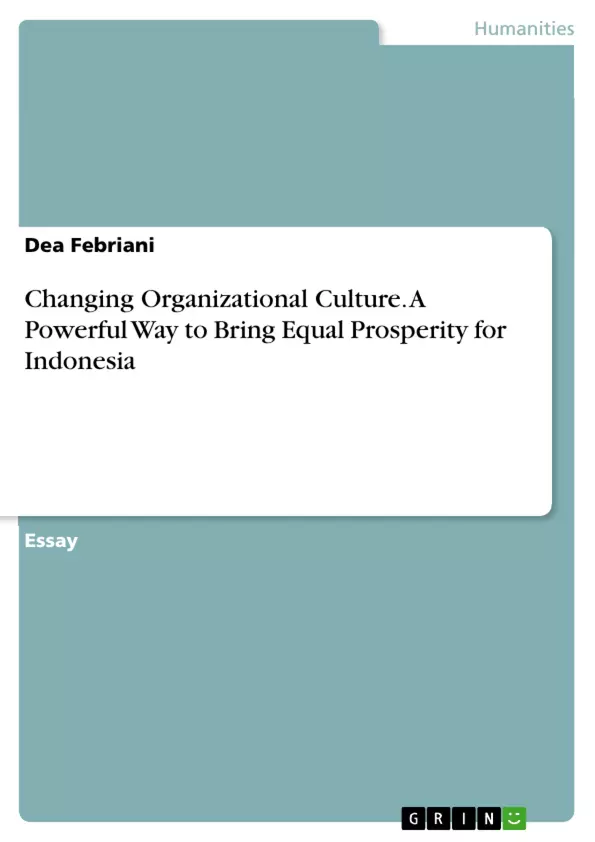Indonesia, as one of the biggest developing countries in the world, is always faced by the problem of inequality among the people. Huge changes should be made to increase the productivity of organizations in Indonesia, which indirectly will contribute to economic growth, thus increasing the prosperity of the people. Through organizational cultural change, this article suggests several ways to create better performance for industrial and governmental organizations in Indonesia.
Inhaltsverzeichnis (Table of Contents)
- Changing Organizational Culture: A Powerful Way to Bring Equal Prosperity for Indonesia
- Challenges for Indonesia
- What is Organizational Culture?
- Organizational Culture in Indonesia
- The Culture in Industrial Organization
- The Culture in Governmental Organization
Zielsetzung und Themenschwerpunkte (Objectives and Key Themes)
The text aims to explore the importance of changing organizational culture in Indonesia to address the issue of inequality and boost economic growth. It emphasizes the critical role of culture in driving organizational performance and its impact on achieving national development objectives.
- The significance of organizational culture in enhancing performance and effectiveness
- The challenges faced by Indonesia, including low productivity, corruption, and the need to adapt to the ASEAN Economic Community (AEC)
- The role of organizational culture in promoting equal prosperity for all Indonesians
- The influence of national culture on organizational culture
- The need for cultural change in both industrial and governmental organizations
Zusammenfassung der Kapitel (Chapter Summaries)
- The text begins by highlighting the economic growth experienced by Indonesia since the 1997-1998 financial crisis, but also emphasizes the persistence of inequality. This discrepancy underscores the need for a more inclusive approach to development.
- The chapter then delves into the challenges facing Indonesia, including the upcoming implementation of the ASEAN Economic Community (AEC) and the need for greater organizational productivity. It emphasizes the potential for threats if these issues are not addressed.
- The following chapter defines organizational culture, providing a multi-layered framework to understand its complexities. This framework distinguishes between artifacts, espoused values, and underlying assumptions.
- The text explores the implications of organizational culture within the Indonesian context, analyzing its impact on industrial and governmental organizations. It highlights the importance of developing a distinctive culture that drives performance and aligns with national goals.
- The chapter focuses on the industrial sector, showcasing successful companies like BCA, Astra International, and Unilever Indonesia. It examines how these companies have successfully implemented a strong culture, aligning values, beliefs, and practices.
- The final chapter addresses the challenges of promoting cultural change in the government sector, acknowledging the deep-rooted issues of corruption and KKN (Korupsi, Kolusi, Nepotisme). The text emphasizes the need for a systemic approach to address these issues and foster a culture of integrity and public service.
Schlüsselwörter (Keywords)
The key focus topics of this text are organizational culture, inequality, economic development, ASEAN Economic Community (AEC), productivity, corruption, and national culture. The text delves into the relationship between organizational culture and national culture, analyzing the specific challenges of Indonesia in achieving inclusive growth and promoting a culture of accountability and efficiency.
Frequently Asked Questions
Why is organizational culture important for Indonesia's development?
Changing organizational culture is seen as a powerful tool to increase productivity, address economic inequality, and foster national prosperity.
What are the main challenges facing Indonesian organizations?
Key challenges include low productivity, systemic corruption (KKN), and the need to adapt to the ASEAN Economic Community (AEC).
How is organizational culture defined in this text?
It is defined using a multi-layered framework consisting of visible artifacts, espoused values, and deep underlying assumptions.
Which Indonesian companies are cited as examples of strong culture?
The text highlights successful industrial organizations such as BCA, Astra International, and Unilever Indonesia for their strong cultural alignment.
What specific cultural issues are identified in the government sector?
The government sector faces deep-rooted issues of corruption, collusion, and nepotism (KKN), requiring a systemic shift toward integrity and public service.
- Quote paper
- Dea Febriani (Author), 2017, Changing Organizational Culture. A Powerful Way to Bring Equal Prosperity for Indonesia, Munich, GRIN Verlag, https://www.grin.com/document/365354



